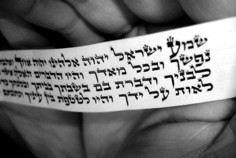
The Shema and the Greatest Commandment
Hear, O Israel, YHVH our God, YHVH is One
The Shema Translated
Hear, O Israel, the Lord is our God, the Lord is One.
Recite the following verse in an undertone:
Blessed be the name of the glory of His kingdom forever and ever.
You shall love the Lord your God with all your heart, with all your soul, and with all your might. And these words which I command you today shall be upon your heart. You shall teach them thoroughly to your children, and you shall speak of them when you sit in your house and when you walk on the road, when you lie down and when you rise. You shall bind them as a sign upon your hand, and they shall be for a reminder between your eyes. And you shall write them upon the doorposts of your house and upon your gates.
The Shema Transliterated
Shema Yisrael, Ado-nai Elo-heinu, Ado-nai Echad.
Baruch sheim kavod mal-chuso li-olam va-ed
Vi-ahav-ta ase Ado-noi Elo-hecha
Bi-chol li-vav-cha oo-vi-chol naf-shecha oo-vi-chol mi-odecha
Vi-hayoo had-varim ha-ele
Asher ano-chi mi-tzvaecha ha-yomal li-vavecha
Vi-shee-nantam li-vanecha vi-dee-barta bam
Bi-sheev-techa bi-vey-techa oo-vi-lech-techa va-derech
Oo-vi-shach-bicha oo-vi-koo-mecha
Ook-shartam li-ose al ya-decha
Vi-hayoo li-to-ta-fose bain ai-necha
Ooch-sav-tam al mi-zoo-zose bai-secha oo-vee-sharecha
History
Originally, the Shema consisted only of one verse: Deuteronomy 6:4 (see Talmud Sukkot 42a and Berachot 13b). The recitation of the Shema in the liturgy, however, consists of three portions: Deuteronomy 6:4–9, 11:13–21, and Numbers 15:37–41. These three portions relate to central issues of Jewish belief.
Additionally, the Talmud points out that subtle references to the Ten Commandments can be found in the three portions. As the Ten Commandments were removed from daily prayer in the Mishnaic period, the Shema is seen as an opportunity to commemorate the Ten Commandments.
Notice that the two larger-print letters in the first sentence ('ayin ע and daleth ד) spell "עד" which in Hebrew means "witness". The idea thus conveyed is that through the recitation or proclamation of the Shema' one is a living witness testifying to the truth of its message. Modern Kabbalistic schools, namely that of the Ari, teach that when one recites the last letter of the word 'echadh' (אחד), meaning "one", he/she is to 'intend that he is ready to "die into God".
Content
The first, pivotal, words of the Shema are:
שמע ישראל יהוה אלהינו יהוה אחד
Judaism teaches that the Tetragrammaton (י-ה-ו-ה) is the ineffable name of God, and as such is not read aloud in the Shema but is traditionally replaced with אדני, Adonai ("my Lord"). For this reason, the Shema is recited aloud as:
Shema Yisrael Adonai Eloheinu Adonai Echad.
The literal word meanings are roughly as follows:
- Shema — listen, or hear (according to the Targum, accept)
- Yisrael — Israel, in the sense of the people or congregation of Israel
- Adonai — often translated as "Lord", it is read in place of the Tetragrammaton
- Eloheinu — our God, the word "El" or "Elohei" signifying God (see also: Elohim), and the plural possessive determiner suffix "nu" or "einu" signifying "our"
- Echad — the Hebrew word for the number 1
In common with other ancient languages, connective words such as "is", and conventions regarding punctuation, are usually implied rather than stated as they would be in modern English.
This first verse of the Shema relates to the kingship of God. The first verse, "Hear, O Israel: the Lord our God is one Lord," has ever been regarded as the confession of belief in the One God. Due to the ambiguities of the Hebrew language there are multiple ways of translating the Shema:
"Hear, O Israel! YHVH is our God! YHVH is One!" and, "Hear, O Israel! YHVH is our God — YHVH alone."
Many commentaries have been written about the subtle differences between the translations. There is an emphasis on the oneness of God and on the sole worship of God by Israel. There are other translations, though most retain one or the other emphases.
V'ahavta
The following verses, commonly referred to by the first word of the verse immediately following the Shema as the V'ahavta, meaning "And you shall love...", contain the commands to love God with all
one's heart, soul, and might; to remember all commandments and "teach them diligently to your children and speak of them when you sit down and when you walk, when you lie down and when you rise"
(Deut 6:7); to recite the words of God when retiring or rising; to bind those words "on thy arm and thy head" (interpreted as tefillin), and to inscribe them on the door-posts of your house and on
your gates (referring to mezuzah).
V'haya im shema
The passage following the "Shema" and "V'ahavta" relates to the issue of reward and punishment. It contains the promise of reward for serving God with all one's heart, soul, and might (Deut 11:13)
and for the fulfillment of the laws. It also contains punishment for transgression. It also contains a repetition of the contents of the first portion -but this time spoken to the second person
plural, (Where as the first portion is directed to the individual Jew, this time it is directed to the whole community, all the Jews).
Vayomer
The third portion relates to the issue of redemption. Specifically, it contains the law concerning the tzitzit as a reminder that all laws of God are obeyed, as a warning against following evil
inclinations and in remembrance of the exodus from Egypt. For the prophets and rabbis, the exodus from Egypt is paradigmatic of Jewish faith that God redeems from all forms of foreign domination. It
can be found in the portion "Shlach Lecha" in the book of Numbers.
Summary
In summary, the content flows from the assertion of the oneness of God's kingship.
Thus, in the first portion, there is a command to love God with all one's heart, soul and might and to remember and teach these very important words to the children throughout the day. Obeying these commands, says the second portion, will lead to rewards, and disobeying them will lead to punishment. To ensure fulfillment of these key commands, God also commands in the third portion a practical reminder, wearing the tzitzit, "that ye may remember and do all my commandments, and be holy unto your God."
The second line quoted, "Blessed be the Name of His glorious kingdom for ever and ever", was originally a congregational response to the declaration of the Oneness of God; it is therefore often printed in small font and recited in an undertone, as recognition that it is not, itself, a part of the cited Biblical verses.
The third section of the Shema formally ends at Numbers 15:41, but in fact traditionally Jews end the recitation of the Shema with the following word from the next verse, Emet, or "Truth", as the end of the prayer.


